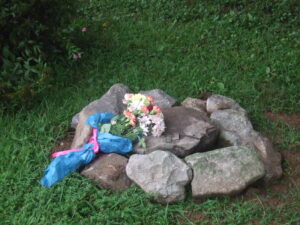I did take flowers to Elvira’s grave, the flowers that I didn’t have for her the day she was buried.
The days after her death were hard, especially the mornings and evenings, which is when David and I washed and dried Elvira off, put fresh food and water in her bowls, gave her her meds and infusions, after which I brushed her off, her tail thumping contentedly with every stroke.
As soon as we returned to the house from burying her, David put away her beds, threw away her meds and food, and washed her food and water bowls. There were empty spaces where she used to be, spaces that I tried not to look at, especially the chair where I brushed her off and the space under the vanity in my bedroom and in the bath cabinet where she liked to sleep.
 Out of habit, I sometimes found myself on the way to the bedroom saying, “I’ll give Elvira a little pet if she’s awake when I get back there.” Or I would turn around to say something to her when I was getting dressed or hanging up clothes. I knew that there would come a time, though, when I would no longer do those things. There would come a time when I would look at the chair she lay in when I brushed her off and I would not cry, when a whole day would go by without my thinking of her.
Out of habit, I sometimes found myself on the way to the bedroom saying, “I’ll give Elvira a little pet if she’s awake when I get back there.” Or I would turn around to say something to her when I was getting dressed or hanging up clothes. I knew that there would come a time, though, when I would no longer do those things. There would come a time when I would look at the chair she lay in when I brushed her off and I would not cry, when a whole day would go by without my thinking of her.
We were a family, Elvira and David and I. They were why I got up every morning. This was what I told myself to make getting up and facing my day easier: “David is with me. But Elvira had to leave us to make that long journey that we all must one day make. She plays now in fields of clover gold. She watches not for the fox or the hawk. And this I know. Always there will be an Elvira.”

Recent Comments